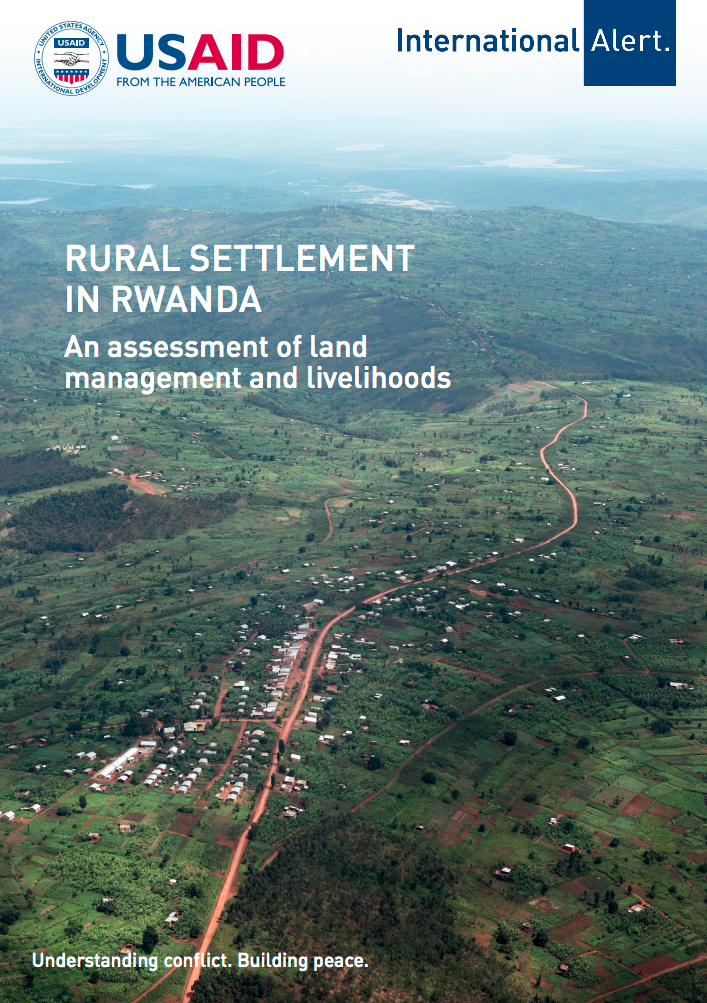Location
We are one of the world’s leading peacebuilding organisations, with 30 years of experience laying the foundations for peace.
We work with local people in over 25 countries around the world to help them build peace, and we advise governments, organisations and companies on how to support peace.
We focus on issues that influence peace, including governance, economics, gender relations, social development, climate change, and the role of businesses and international organisations in high-risk places.
We work in Africa, south and southeast Asia, central Asia, the South Caucasus, Europe, Latin America, and the Middle East and north Africa, and have 18 offices around the world.
We believe peace is possible when people can live in safety, have fair and effective laws, participate in shaping political decisions, make a decent living and secure their wellbeing.
Members:
Resources
Displaying 1 - 5 of 9Decision-Making and Joint Control Rights over Land in Rwanda
Report explores and analyses community perceptions of the obstacles facing women’s participation in decision-making about jointly held land. Also examines the factors that prevent women from participating in community-level decision-making structures, specifically those related to land. Conducted in 4 districts of Rwanda: Ngororero and Rutsiro (Western Province), Huye (Southern Province) and Ngoma (Eastern Province).
Rural Settlement in Rwanda: An assessment of land management and livelihoods.
Residential land in Rwanda is scarce due to hilly terrain, a high population and a focus on agricultural growth to address food security concerns. The situation worsened following the 1994 genocide against the Tutsi, which led to extensive destruction of houses and infrastructure, leading to thousands of Rwandans becoming homeless. To address these concerns, the government embarked upon a resettlement programme to regroup people into planned residential areas, ‘imidugudu’, the aim of which is to provide improved quality of life for the population through the provision of basic needs.
The Need for Conflict-Sensitive Land Policy and Land Governance in Africa
Includes land and violent conflict in Africa; land policy in conflict-affected or conflict-prone contexts; key elements of conflict-sensitive land policy; the framework and guidelines for land policy in Africa; role of the different actors; conclusions and recommendations.
Land, Power and Identity: Roots of violent conflict in Eastern DRC
Identifies disputed control over land as a root cause of conflict in Eastern DRC. Focuses on conflicts between customary and state-run land tenure systems, and claims by some communities to ‘indigenous’ status which are used to relegate others to ‘migrant’ or ‘foreigner’ status. Waves of population displacement have created overlapping claims to land, and an ongoing process of refugee return is currently increasing tensions over these claims in parts of Eastern DRC. Examines efforts to manage this return process and offers recommendations for action by local and international actors.
Building Community Resilience; harnessing traditional Ecological knowledge to combat climate change
General
Inspired by OCH and aligned to Africa framework call to enhance local voice and agency, this project will contribute to two outcomes of the Kenya Resilience programme; Outcome 3; Degraded landscapes restored and protected through sustainable land management and providing a stream of ecosystems services Outcome 5: Policy and decision makers are actively implementing plans, budget and initiatives that support environment and food security, water related issues, and livelihoods of women and youth. Phased in annual plans for three years, Jesuit Hakimani through this project is seeking to enhance Voice and Agency of local community in policy dialogue that will lead to understanding impacts of climate change to marginalised and indigenous communities. Traditional ecological knowledge, has potential to play a central role in both indigenous and non-indigenous climate change initiatives also called climate change local adaptation mechanisms. The detection of environmental changes, the development of strategies to adapt to these changes, and the implementation of sustainable land-management principles are all important climate action items that can be informed by traditional ecological knowledge. Intention is to include traditional ecological knowledge as a voice of the local community into climate research, ecological education, resource planning and decision-making processes that should eventually be incorporated, as a local voice & local content into the climate change policy, climate action plans and assessments, and more important for resilience improve adaptation efforts at County, National, and Regional, levels. The two objectives are; 1. Local voices and local content developed to inform training and evidence based advocacy activities 2. Inclusion of indigenous knowledge and information in local, national and regional policy dialogue and advocacy engagements




